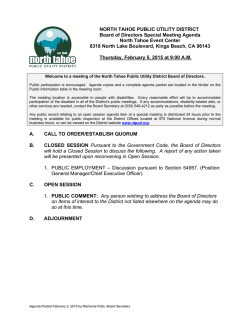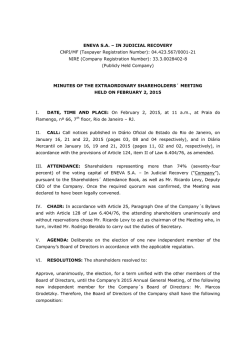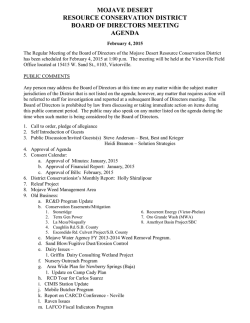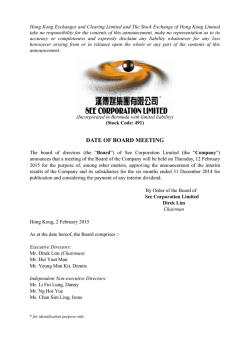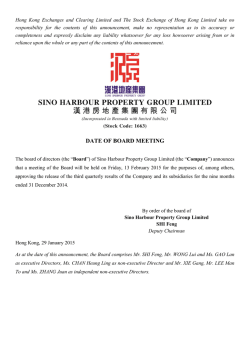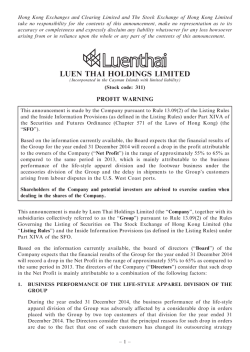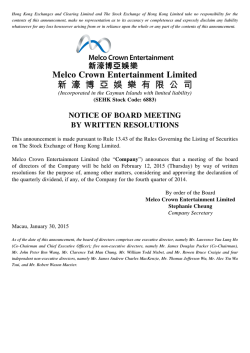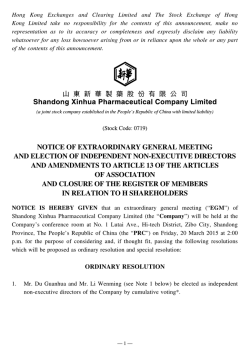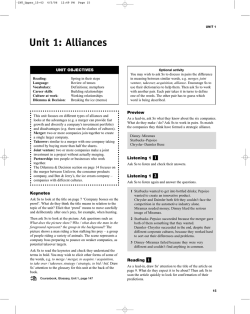
Virginia Court Refuses to Dismiss Derivative Lawsuit Challenging
February 2015 Virginia Court Refuses to Dismiss Derivative Lawsuit Challenging Merger Involving Conflicts of Interest A federal district court in the Eastern District of Virginia recently denied a motion to dismiss certain claims brought by a shareholder challenging a merger. The decision, DCG&T v. Knight, C.A. No. 3:14-cv-067JAG (E.D. Va. Dec. 18, 2014), held that claims for breach of fiduciary duty must be brought derivatively on behalf of a Virginia corporation. But the court also held that, for purposes of surviving a motion to dismiss, the plaintiff had sufficiently alleged a breach of fiduciary duty by the corporation’s directors and officers. Importantly, each member of the board of directors was also a director of one of the other merging parties. Knight is the second decision in less than a month from a federal court addressing directors’ duties under Virginia law. Background The challenged transaction involved a merger of three related real estate investment trusts (“REITs”) in which two of the REITs (the “merged REITs”) merged with and into the third REIT (the “surviving REIT”). Each REIT was managed by the same management team. In addition, each director of the surviving REIT was also a director of one of the merged REITs, thus creating overlapping directorships. In the merger, the shareholders of the merged REITs received equity in the surviving REIT. Also, certain directors and officers held preferred stock in one of the merged REITs that was converted into common stock of the surviving REIT. In the period leading up to the merger, the surviving REIT formed a special committee to negotiate the transaction. The special committee retained reputable financial and legal advisors, but both members of the special committee were also directors of one of the merged REITs. Based on the special committee’s recommendation, the surviving REIT’s board of directors approved the merger agreement but, citing the conflicts of interest arising from the overlapping directorships, did not make a recommendation to the shareholders. The lawsuit was brought by one of the surviving REIT’s shareholders, who alleged that the directors and officers breached their fiduciary duties. The Court’s Opinion 1. Fiduciary Duty Claims are Derivative, not Direct First, the court held that the shareholder’s breach of fiduciary duty claims were derivative, not direct. Relying on the Supreme Court of Virginia’s decisions in Simmons v. Miller, 261 Va. 561 (2001), and Remora Investments, LLC v. Orr, 277 Va. 316 (2009), the court held that, under Virginia law, such claims belong to the corporation. It explained that “[t]his position makes sense viewed alongside the nature of corporate directors’ fiduciary duties in Virginia” because those duties run to the corporation and the shareholders “as a class,” not to shareholders individually. The court also explained that treating these claims as derivative prevents multiple lawsuits, “possibly with inconsistent results,” and allows all shareholders to “recover equally.” Thus, the plaintiff’s direct claims were dismissed. © 2015 Hunton & Williams LLP 1 As an aside, the court did not apply Delaware’s test for distinguishing between derivative and direct 1 claims. It noted that, in Remora, the Supreme Court of Virginia “explicitly declined to adopt Delaware’s framework.” 2. Plaintiff Stated a Derivative Claim for Breach of Fiduciary Duty Next, the court held that the complaint sufficiently pled a breach of fiduciary duty for purposes of surviving a motion to dismiss. The court said the complaint alleged, among other things, that: • “the Directors intentionally favored the interests of insiders holding preferred stock to the detriment of common shareholders”; • “the Directors … failed to ‘fully inform themselves’ of the true value of each [party to the merger] prior to the merger while knowingly relying on financial opinions that were out of date”; • “the fairness reports on which the Directors relied were ‘stale’ ”; and • “the Directors knowingly engaged in a flawed and conflicted decision making process.” The court also reasoned that the plaintiff’s claims did not rely on so-called “Revlon duties” arising under Delaware law, and instead were merely based on the duties of loyalty and care. In addition, the court said the “allegations plausibly state willful misconduct” to overcome the exculpatory clause in the surviving REIT’s articles of incorporation. 3. Plaintiff Stated a Derivative Claim for a Conflict of Interest Transaction The court also held that the plaintiff could seek to void the merger as an interested transaction under Section 13.1-691 of the Virginia Stock Corporation Act, although the claim had to be brought derivatively rather than directly. The court agreed with the plaintiff that “[t]he fact that each [surviving REIT] director also sat on the board of either [of the merged REITs] clearly shows that none could be disinterested in the transaction.” The court also rejected the defendants’ argument that the transaction had been ratified by disinterested shareholders in accordance with Section 13.1-691A.2. The court said that factual issues remained as to whether the shareholders had properly ratified the merger. 4. Plaintiff Did Not State a Claim Under the Affiliated Transactions Statute The court rejected the plaintiff’s argument that the merger was governed by Virginia’s affiliated transactions statute, which places certain restrictions on mergers with shareholders who own more than 2 10% of a company’s voting stock. The plaintiff failed to plead that the other REITs or the management team owned shares of the surviving REIT in excess of this threshold, and the court rejected the plaintiff’s generalized allegations that the management team’s “control” of the REITs rendered the merger an “affiliated transaction.” 5. Plaintiff Had Standing to Pursue the Derivative Claims Finally, the court found the plaintiff had standing to pursue its derivative claims under the Virginia Stock Corporation Act, at least for purposes of surviving a motion to dismiss. Among other things, the court said the plaintiff did not have to wait 90 days after making its demand on the board before initiating the lawsuit 3 because there was a threat of “irreparable injury.” The court explained that, had the plaintiff waited the requisite time period, the merger would have been consummated, which “would have allowed the defendants to successfully perpetrate a fraud on the shareholders.” 1 See generally Tooley v. Donaldson, Lufkin & Jenrette, Inc., 845 A.2d 1031 (Del. 2004). 2 See Va. Code Ann. §§ 13.1-725 et seq. 3 Id. § 13.1-672.1B.2. © 2015 Hunton & Williams LLP 2 Conclusion and Implications Virginia’s corporate laws are generally deferential to boards of directors. This does not mean, however, that conflicts of interest will not be scrutinized. Here, each director of the surviving REIT was also a director of one of the merged REITs. In that situation, the directors are placed in a difficult position, owing fiduciary duties to two separate corporations and groups of shareholders. In addition, certain insiders owned preferred stock that was being converted in the merger, which appears to have created a separate benefit not shared by the common shareholders. Because of these conflicts, the merger was not approved by a majority of disinterested and independent directors. This does not mean the directors engaged in “willful misconduct,” but in this type of situation, parties must anticipate that the transaction will likely be scrutinized for fairness if challenged. Delaware law would treat this transaction in a similar 4 manner. Knight can be contrasted with the federal court’s decision in Malon v. Franklin, issued just weeks earlier. There, a majority of disinterested and independent directors approved the sale of a Virginia bank in a stock-for-stock merger. The record in that case indicated that the independent directors engaged in an informed decision-making process. As a result, the court dismissed the shareholder’s complaint, finding that it did not adequately allege the directors breached their fiduciary duties under Virginia law. There are several points pertinent to Knight’s conflicts of interest analysis that bear noting. First, the directors chose not to make a recommendation to the shareholders, as permitted by the Virginia Stock 5 Corporation Act. The joint proxy statement/prospectus explained there was no recommendation “because of the overlap among the directors of the [REITs].” At least at the pleading stage, however, this does not appear to have provided the directors any protection since they still had to discharge their duties by adopting the plan of merger. Second, the Virginia Stock Corporation Act allows disinterested shareholders to ratify an interested transaction. The court held, however, that there were factual questions as to whether the shareholders were sufficiently informed. This shows the importance of adequate disclosure, but it also shows that this defense may not always be available on a motion to dismiss. The court’s ruling can be contrasted with Malon, which rejected numerous disclosure challenges. Third, the court indicated that the merger could be voided based on the directors’ conflicts of interest, but it did not address Section 13.1-614 of the Virginia Stock Corporation Act. That section generally restricts a court’s ability to reverse or annul an action of the State Corporation Commission — such as issuing a certificate of merger. In any event, it would seem that voiding the merger would be impractical now that the merger has closed and the “eggs have been scrambled.” The court’s conclusion that the plaintiff’s claims were derivative is important. There is limited Virginia case law dealing with the derivative/direct distinction, but the Virginia courts that have addressed the issue have consistently treated breach of fiduciary duty claims as derivative. This is beneficial for corporations because the Virginia Stock Corporation Act imposes various conditions on bringing derivative suits, in part to deter frivolous claims. It is interesting to note, however, that the court said demand was excused because waiting 90 days might have led to irreparable injury — yet the merger had already closed at the time the court issued its opinion. M&A practitioners will likely take issue with the plaintiff’s allegation that the outside financial advisor’s fairness opinion was “stale.” As is customary, the fairness opinion appears to have been delivered to the 4 Cf. Weinberger v. UOP, Inc., 457 A.2d 701, 710 (Del. 1983) (“Individuals who act in a dual capacity as directors of two corporations, one of whom is parent and the other subsidiary, owe the same duty of good management to both corporations, and in the absence of an independent negotiating structure, or the directors’ total abstention from any participation in the matter, this duty is to be exercised in light of what is best for both companies.”). 5 See Va. Code Ann. § 13.1-718A.2. © 2015 Hunton & Williams LLP 3 surviving REIT’s board of directors in connection with the execution of the merger agreement. That is the time at which the board of directors takes action by exercising its business judgment whether to approve the merger. Moreover, it is rare for transactions to be conditioned on obtaining a “bring down” fairness opinion in connection with the shareholders’ meeting or closing. The real issue in the litigation may have been whether the board of directors should have reevaluated the merger or updated its disclosures to shareholders based on new developments that allegedly occurred between the signing of the agreement and the shareholders meeting. Ultimately, Knight can be explained primarily by the overlapping directorships between the merging parties, which created a conflict of interest, and by the liberal pleading standard applicable to a motion to dismiss under Rule 12(b)(6). In addition, the REITs had recently settled claims with the Securities and Exchange Commission relating to disclosures about their valuations, which may have been another red flag to the court. If this case goes to trial, it is quite possible that the directors will prevail. Virginia corporations can also take comfort in the Malon case, noted above, where a majority of the directors were disinterested and independent with respect to the merger. To the extent there were conflicts of interest in that case, they were routine, relatively immaterial, and fully disclosed to shareholders. As a result, the court found the plaintiff had failed to plead that the directors failed to exercise their good faith business judgment in accordance with Virginia law. Contacts Allen C. Goolsby [email protected] Steven M. Haas [email protected] © 2015 Hunton & Williams LLP. Attorney advertising materials. These materials have been prepared for informational purposes only and are not legal advice. This information is not intended to create an attorney-client or similar relationship. Please do not send us confidential information. Past successes cannot be an assurance of future success. Whether you need legal services and which lawyer you select are important decisions that should not be based solely upon these materials. 4
© Copyright 2026
